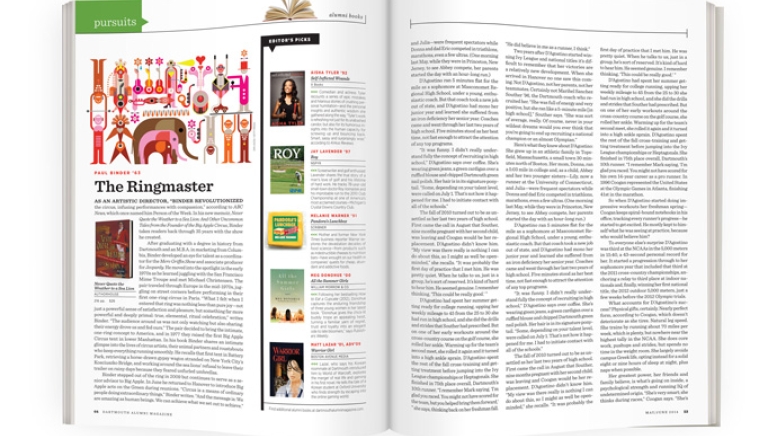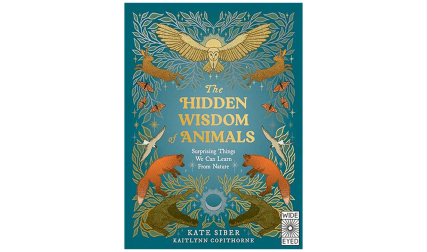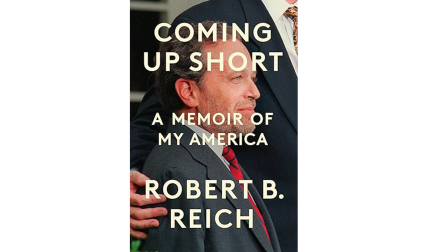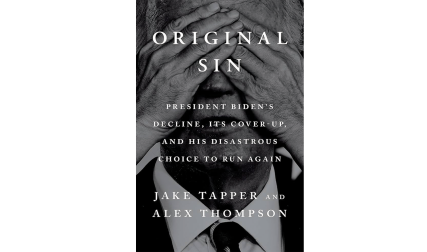Paul Binder ’63
The Ringmaster
As an artistic director, “Binder revolutionized the circus, infusing performances with compassion,” according to ABC News, which once named him Person of the Week. In his new memoir, Never Quote the Weather to a Sea Lion: And Other Uncommon Tales from the Founder of the Big Apple Circus, Binder takes readers back through 35 years with the show he created.
After graduating with a degree in history from Dartmouth and an M.B.A. in marketing from Columbia, Binder developed an eye for talent as a coordinator for the Merv Griffin Show and associate producer for Jeopardy. He moved into the spotlight in the early 1970s as he learned juggling with the San Francisco Mime Troupe and met Michael Christensen. The pair traveled through Europe in the mid-1970s, juggling on street corners before performing in their first one-ring circus in Paris. “What I felt when I entered that ring was nothing less than pure joy—not just a powerful sense of satisfaction and pleasure, but something far more powerful and deeply primal: true, elemental, ritual celebration,” writes Binder. “The audience around us was not only watching but also sharing; their energy drove us and fed ours.” The pair decided to bring the intimate, one-ring concept to America, and in 1977 they raised the first Big Apple Circus tent in lower Manhattan. In his book Binder shares an intimate glimpse into the lives of circus artists, their animal partners and roustabouts who keep everything running smoothly. He recalls that first tent in Battery Park, retrieving a horse-drawn gypsy wagon stranded on New York City’s Kosciuszko Bridge, and working around the sea lions’ refusal to leave their trailer on rainy days because they feared unfurled umbrellas.
Binder stepped out of the ring in 2009 but continues to serve as a senior advisor to Big Apple. In June he returned to Hanover to introduce Big Apple acts on the Green during reunions. “Circus is a means of ordinary people doing extraordinary things,” Binder writes. “And the message is: We are amazing as human beings. We can achieve what we set out to achieve.”
Aisha Tyler ’92
Self-Inflicted Wounds
Comedian and actress Tyler recounts a series of epic mistakes and hilarious stories of crushing personal humiliation—and the personal insights and authentic wisdom she gathered along the way. “Tyler’s work is refreshing not just for its unabashed candor, but also for its humorous insights into the human capacity for screwing up and bouncing back. Smart, sassy and surprisingly wise,” according to Kirkus Reviews. (IT Books)
Jay Lavender ’97
Roy
Screenwriter and golf enthusiast Lavender shares the true story of a man’s love of golf and his lifetime of hard work. He tracks 78-year-old small-town doctor Roy Vomastek and his improbable run to the 2010 Club Championship at one of America's most acclaimed courses—Michigan’s Crystal Downs Country Club. (NSPYR)
Melanie Warner ’91
Pandora’s Lunchbox
Mother and former New York Times business reporter Warner explores the devastation decades of food science—from products such as indestructible cheeses to nutrition bars—have wrought on our health in companies’ quests for cheap, abundant and addictive foods. (Scribner)
Meg Donohue ’00
All the Summer Girls
Following her bestselling How to Eat a Cupcake (2012), Donohue captures the enduring friendship of three young women in her latest book. “Donohue gives the chick-lit buddy trope an appealing twist, turning a familiar yarn of regret, trust and loyalty into an elegant ode to late bloomers,” says Publishers Weekly. (William Morrow & Co.)
Matt Lazar ’01, Adv’09
Warrior Girl
Lazar, who says his Korean roommate at Dartmouth introduced him to World of Warcraft, explores the merger of real life and gaming in his first novel. He tells the tale of a Korean student at Oxford University who finds strength by escaping into the online gaming world. (Boston Avenue Media)
Additional books that were not listed in our print version:
Pulitzer Prize-winning playwright Frank Gilroy ’50 dives into the world of Castro’s revolutionary Cuba, where a Hollywood director and screenwriter duo are taken hostage while scouting film locations, in his latest Kindle Single, Crooning (Amazon).
Longtime Newsweek editor Larry Martz ’54, after a career in journalism spanning 60 years, offers a thriller about newspaper reporting in lusty and colorful Detroit in his first novel, To Know the Truth: A Newspaper Novel of the ’50s (Authorhouse).
George Seielstad ’59, a former astronomer and earth system scientist, explores methods of creating a sustainable future for our planet in Dawn of the Anthropocene: Humanity’s Defining Moment (American Geosciences Institute).
Harvard law professor Al Ryan ’66 chronicles the 1946 trial of Gen. Tomoyuki Yamashita for war crimes in the Philippines in Yamashita’s Ghost: War Crimes, MacArthur’s Justice, and Command Accountability (University Press of Kansas).
In The Transsexual Scientist: The Causation and Experience of Transsexualism and Transgenderism (Bevan Industries) biopsychologist Dana (formerly Thomas) Bevan ’69 describes both her experience and the search for the scientific causes of transsexualism.
In his second Zach Colt thriller, Michael Urban ’78 follows Colt as he takes back a hijacked USS Constitution from international terrorists in Ironside’s Peril (Amazon Digital).
N. Bruce Duthu ’80, the Samson Occom professor and chair of Dartmouth’s Native American studies program, argues for a revised legal and political relationship between tribes and the federal government in Shadow Nations: Tribal Sovereignty and the Limits of Tribal Sovereignty (Oxford University Press).
NYU science journalism professor and environmental health journalist Dan Fagin ’85 recounts the 60-year saga of pollution of Toms River, New Jersey, by chemical companies and the individuals who fought to reveal its devastating effects on the community in Toms River: A Story of Science and Salvation (Random House).
Anne Drapkin Lyerly ’91, M.D., professor of social medicine and associate director of the center for bioethics at UNC Chapel Hill, shares the findings of a three-year study of birth experiences to reveal some universal female needs in A Good Birth: Finding the Positive and Profound in Your Childbirth Experience (Avery).
Luis Vivanco ’91, an anthropology professor and director of global and regional studies at the University of Vermont, explores the benefits of bike cultures of Burlington, Vermont, Amsterdam and Bogota in Reconsidering the Bicycle: An Anthropological Perspective on a New (Old) Thing (Routledge).
After spending five years immersed in Costa Rican culture, travel writer James Kaiser ’99 offers a behind-the-scenes look at the “happiest country on earth” with Costa Rica: The Complete Guide (Destination Press).
University of North Carolina, Chapel Hill, social medicine professor Mara Buchbinder ’02 takes a critical look at the benefits, effects and uncertainties of state-mandated newborn genetic screening Saving Babies? The Consequences of Newborn Genetic Screening (University of Chicago Press).
Psychology professor and eating disorder researcher Dr. Jennifer Thomas ’03 draws from the latest research and stories of personal recovery to offer tips on overcoming “almost anorexia,” a term for undiagnosed symptoms of an eating disorder, in Almost Anorexic: Is My (or My Loved One’s) Relationship with Food a Problem? (Hazledon Publishing/Harvard Health Publications).
Katharine Britton, Adv’05, who teaches at the Institute of Lifelong Education at Dartmouth, tells the story of a patrician family whose long-held secrets threaten to tear them apart in her second novel, Little Island (Berkley Trade).
Berkeley postdoctoral fellow and urban education policy specialist Caitlin Farrell ’05 examines research on charter schools to identify the factors that contribute to these schools’ successes in Choices & Challenges: Charter School Performance in Perspective (Harvard Education Press).




